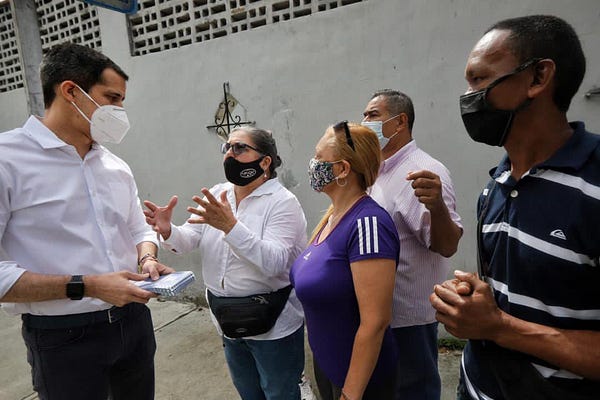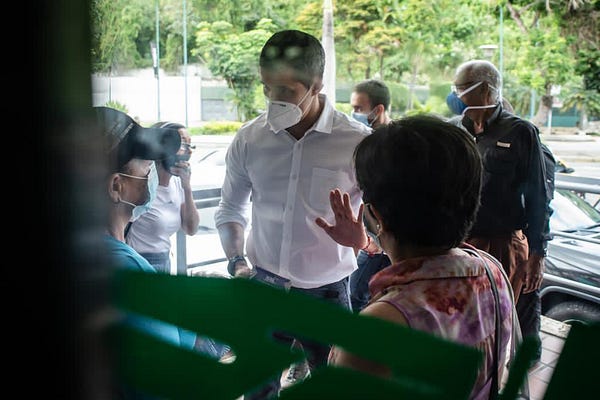Venezuela - Maduro increasing repression while eyeing political transitions
Political shifts inside Venezuela and the US mean Maduro believes he benefits by cracking down harder right now. But he might be wrong.
The Maduro regime is currently taking hostages and other hostile actions and this is likely to continue for the coming two months. Two reasons:
Maduro wants to appear to be in full control of the situation in Venezuela and will use repressive mechanisms to target institutions that threaten the image of total control in any way.
Maduro and his allies want to obtain what they believe to be a better negotiating position vis-a-vis the incoming Biden administration in the US.
This heightened level of aggression should be a concern for companies with personnel or interests in the country. In addition, the regime is likely to become more sensitive to protests in the coming two months with the events in the political landscape. They may choose to respond with greater force than they have used recently.
Maduro attacks a charity and jails US citizens
Agents raided the offices of Feed the Solidarity, an NGO that feeds around 25,000 children in Venezuela. The Maduro regime also froze the bank accounts of the charity, preventing it from receiving foreign aid and distributing money to its partners around the country. What is the political motivation in targeting a charity in a country where most people do not have enough to eat? First, it offers food through distribution channels not controlled by the Maduro regime, a problem when Maduro is known to use food as a political tool and weapon to reward supporters and punish opponents. Second, the charity is run by Roberto Patiño, a political opponent of Maduro, though he stresses that the charity work is nonpolitical.
On Thanksgiving Day in the US, the “Citgo 6” executives were found guilty and sentenced to varying years in prison. The six men (five US citizens and one US permanent resident) were detained in November 2017 and held for over two and a half years without a trial. The trial was conducted in secret in recent months and the charges relate to a proposal to offer a percentage of Citgo ownership as collateral on bonds.
Events in the weeks ahead will likely increase political clashes
Given those events, additional actions against US companies and interests should be expected in the coming two months regardless of what occurs in next weekend’s elections. As I wrote in early September, Venezuela is entering a particularly complicated period of political clashes.
The Maduro regime is pushing forward with legislative elections on 6 December. A group of sham opposition parties will participate while most of the traditional opposition parties and politicians will boycott. Henrique Capriles, who had negotiated to participate, is also boycotting after Maduro’s refusal to meet even the most basic conditions for more fair elections.
In mid-December, Guaido and his allies will hold a referendum to reject Maduro and support the continuation of the current de jure government under the authority of the current National Assembly. The photos below from Guaido’s Twitter feed show the de jure president campaigning in person around Caracas. The National Assembly continues to work to build a legal framework and justification for their governing authority next year. Given that the referendum will be held partially online, Maduro may restrict or shut down communications infrastructure around the time of the Guaido referendum in order to disrupt it.





Tensions generally slow down in the weeks around Christmas. However, with a high profile clash scheduled for January and with a population lacking food and fuel, protests and violent repression of protesters may continue through the holiday season at unusually high levels.
On 5 January, the official mandate of the current National Assembly and Juan Guaido’s government ends. While the de jure president is making an effort to legitimize his continued legal status as the country’s leader given the inability to hold democratic elections, the scheduled power transfer may weaken Guaido’s political capital. Maduro is likely to push for governments to either stop recognition of Guaido or at least recognize the parallel legitimacy of the National Assembly members elected in December.
On 20 January, the US administration changes hands. After the transition of power in the US, Maduro would be smart to send some positive signals to the new administration including removing Tareck el-Aissami from PDVSA management. As Caracas Chronicles writes, “next year might be the year for hiding the worst elements of the regime, and not parade them in high-visibility posts for the world to see.” However, Maduro doesn’t always follow the most logical or smart strategy. Even though it would not be his best move, don’t discount the possibility that Maduro furthers his crackdown as he misreads the moment.
One wild card with unknown timing hanging over these events is the potential extradition of Alex Saab from Cape Verde to the US. The Maduro regime does not want Saab extradited given what he knows about Venezuela’s sanctions evasion efforts.
Biden’s policy changes will not be instant and won’t reward bad behavior
In interviews throughout the campaign, Biden and his advisors telegraphed their opening moves on Venezuela policy. They are going to offer TPP to Venezuelan refugees in the US and assistance to Venezuelan refugees around the hemisphere. Those initial actions deal more with the impact of Venezuela’s humanitarian crisis beyond its borders than with the political clash within the country. Sanctions relief is not going to be the first item on the agenda and when it does occur it will focus on improving the lives of Venezuelan citizens while maintaining pressure on Maduro and his allies.
If Maduro believes his crackdown gives him additional leverage in negotiations with the incoming Biden administration, he has likely miscalculated. While more open to negotiations than the Trump administration, Biden’s team is less transactional than Trump’s and will likely respond negatively to pressure tactics like crackdowns and arrests. Additionally, Maduro’s recent actions will likely increase Congressional pressure on the new administration to provide any concessions in negotiations.
The Biden team will want to see significant steps towards restoring democracy and human rights before they take any steps that relieve sanctions pressure on Maduro. They may open some channels to discuss issues of mutual interest, but their message is unlikely to be anywhere near as conciliatory towards Maduro as the de facto leader’s allies may hope.
Thanks for reading
If you want to be added to the newsletter distribution list, please enter your email at https://boz.substack.com/ or email me at boz@substack.com and I will add you.
ANNOUNCEMENT: I plan to hold an online event on Monday, 14 December, at 1PM EST. This event is for paying subscribers of the newsletter. It will run about an hour and I’ll talk about how I view the region in 2021 and take questions. If you are a paying subscriber, you’ll get an invitation with login/dial-in instructions in the coming days. I’ll try to record it for those who can’t make it.


